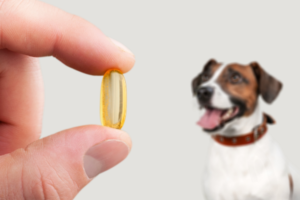Fish Oil for Dogs
There are many reasons to give fish oil for dogs, and with so many products available on the market today, you’re sure to find the perfect supplement for your dog’s needs.
However, if you’re feeding your pooch high-quality food, you may not have thought about supplementing their diet with fish oil before. The truth is, it’s one of the most beneficial supplements you can add to your doggy’s diet.
If you’re feeling confused about fish oil for dogs — don’t worry, this article is full of all the information you need to know.

What Is Fish Oil?
Fish oil is a supplement that’s taken due to the many health benefits of ingesting omega-3 fatty acids. As humans, we’re encouraged to supplement this nutrient because the human body doesn’t produce these essential fats itself. The same goes for our furry friends. Your four-legged buddy also has to consume this from their diet.
You can find fish oil supplements for dogs in several forms — pills, chewable tablets, and liquid oil. However it’s delivered, fish oil is bursting with health benefits and is something to consider incorporating into your dog’s diet.
What Fish is Fish Oil Made From?
Fish oil is sourced from various fatty fish. Here’s a quick roundup of the types you will come across.
- Salmon oil for dogs.
- Wild Alaskan salmon oil.
- Krill oil for dogs.
- Pollock oil for dogs.
- Herring oil for dogs.
- Cod liver oil for dogs.
- Sardine oil for dogs.
- Anchovy oil for dogs.
- Mackerel.
- Herring.
Fish Oil for Dogs Benefits

Omega-3 is made up of three essential polyunsaturated fats — DHA, ALA, and EPA. These fatty acids are crucial for hormones to regulate blood flow and manage inflammation in the body. Giving fish oil to dogs can have a large range of benefits, all thanks to the three essential fatty acids found in omega-3.
So, when can dogs have fish oil?
Sometimes doggy parents choose to give their dog a fish oil supplement following an injury or as part of their recovery from an illness or operation. However, while giving your dog fish oil for a short period will help, to see just how much fish oil can positively impact your dog’s overall health and wellbeing, you will need to give them regular doses for a prolonged period.
To give you an idea, here is a list of the key health benefits:
- Balances out omega 6 fatty acids — Processed dog food is often heavy in omega 6 (found in grains) and in comparison has very little omega-3. While the former is important, an imbalance between these omegas can lead to health problems. Fish oil provides your dog with a healthy balance between the different fatty acids.
- Aids brain and eye development in puppies — DHA is very important for puppy development. It supports healthy eyes and is reported to improve cognitive function.
- Helps chronic kidney disease — Research has shown that fish oil can be used effectively to treat chronic canine kidney disease.
- Treats arthritis — Omega-3s are an effective anti-inflammatory. Hence, fish oil is often recommended to treat dogs suffering from arthritis and joint pain.
- Lowers blood pressure — Fish oil for dogs lowers blood pressure and supports normal blood circulation around the body. Omega-3 reduces triglycerides (fat) in blood, which can help hounds who are suffering from certain heart conditions and diseases.
- Slows the spread of cancer — Amazingly, omega-3 is believed to slow the growth and spread of certain cancers in canines. This potential life-saving benefit can occur as omega-3 can inhibit the growth of cancerous cells.
- Eases allergy symptoms — If your dog suffers from allergies, omega 3 for dogs can help to relieve itchiness and inflammation.
- Better coat condition — Excessive itching due to dog allergies leads to shedding. Omega-3 relieves itching, therefore may result in less dog hair covering every surface in your home! Fish oil for dogs has also been linked to a shiner and more silky coat.
As you can see, there are many advantages to dog fish oil. However, there are also fish oil for dogs side effects that every conscientious pooch parent should be aware of.
Side Effects of Fish Oil for Dogs
Overall, fish oil is considered safe for dogs to consume. However, in excessive doses, or if taken alongside some forms of medication, it can have some side effects. Your pooch could experience:
- Vomiting.
- Diarrhea.
- Oily coat
- Weight gain.
- Fishy breath.
- Longer healing period for wounds.
- Sleepiness.
If you’re concerned about your dog’s health after giving them fish oil, seek professional advice from your vet. You may be advised to stop the supplement, or the current dosage may need to be revised.

The Different Forms of Fish Oil for Dogs
Now you know all of the pawsome plus points of fish oil for dogs, you’ll need to decide which supplement form would suit your pooch.
Fish oil can be given to your dog in the following:
- Liquid.
- Tablets/capsules.
- Chewables.
- Dog food enriched with fish oil.
Giving your dog liquid fish oil by mouth can be a messy and tricky business. Hence, the popularity of chewable tablets. This type of supplement mimics dog treats, so your pooch will likely take them without a wrestling match — providing they like the taste. Another option is to crush the fish oil pills for dogs or rip open the capsule and sprinkle it over or mix it into your dogs’ food.
Conclusion
Giving your dog fish oil can significantly improve their overall health and wellbeing. These fatty acids carry a whole host of health benefits and can be used to treat a range of conditions such as fish oil for dogs itchy skin, for joint pain, and can also help to give them a shiny coat.
In short, fish oil for dogs can support your dog throughout their whole life, right from their puppy days up until their senior years.
Fish Oil for Dogs FAQs
Is Fish Oil Good for Dogs?
Absolutely. The omega-3s in fish oil supplements carry a whole host of health benefits for your dog. For example:
- Supports brain development in puppies.
- Boosts your dog’s immune system.
- Eases joint pain.
- Reduces inflammation.
- Helps treat canine kidney disease.
What Is the Best Fish Oil for Dogs?
You can find out this and more in our in-depth guide to Omega 3 for Dogs.
How Do I Give My Dog Fish Oil?
You can give your dog fish oil as a chewable tablet, or in liquid form by using a syringe/spoon. Other methods include crushing up tablets or breaking open the supplement and sprinkling it over/mixing it into your dog’s wet food.
How Often Should I Give My Dog Fish Oil?
Adding any amount of fish oil into your dog’s diet will have health benefits for your pooch. However, for the most impact, you should give your dog a daily dose of omega-3s. Dosage is calculated depending on weight. Consult the omega-3 supplement packaging to determine the best dose for your dog.
Does Fish Oil Help Dogs With Itchy Skin?
Fish oil can help dogs with allergy symptoms, including itchy skin. Omega-3 fatty acids can also help to reduce any skin inflammation caused by biting and scratching. By reading the labels of different supplements, you’ll be able to find the best fish oil for itchy skin.
Is Fish Oil for Dogs Safe?
Whether you’re using fish oil for dog shedding or to help your puppy have the best start in life, it’s considered safe. However, in large doses or even when taken alongside other medication there is a risk of some adverse effects. Dogs may suffer from the following:
- Sickness.
- Diarrhea.
- Blood clotting issues.
- Lethargy.
For more info, check out our side effects of dog omega-3 in this post. You may have read articles with scaremongering headlines such as, ‘I almost killed my dog with fish oil,’ but when used correctly and following the correct fish oil for dogs dosage, omega-3 supplements shouldn’t endanger your dog’s life.
Can I Give My Dog Cod Liver Oil?
Cod liver oil for dogs can have many health benefits and is recommended for canines suffering from certain heart conditions and diseases. Cod liver oil tablets for dogs are a good source of omega-3 fatty acids. Pooch parents also use cod liver oil for dog skin problems and to boost their canine companion’s immune system.
Should I Give My Dog Fish Oil Every Day?
There is no harm from providing your dog with a daily dose of fish oil but most pets should be getting their daily dose from their food. For the vast majority of pet parents, fish oil is only given when recommended by their vets for specific health issues.
Can You Give a Dog Human Fish Oil?
You shouldn’t use human fish oil for dogs. While you may think it’s safe as the omega-3 fatty acids are the same, often omega-3 for humans will have added sweeteners that are toxic for dogs.
Finding the correct human fish oil for dogs dosage can be difficult. And, it makes little sense to use human-grade supplements when there are products available specifically designed to meet the needs of your canine companion.


